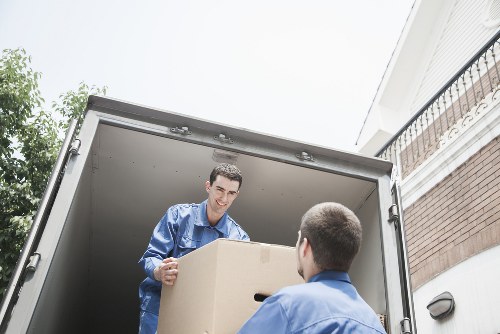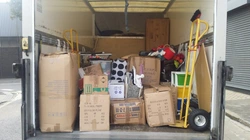Efficient Commercial Moves with Moving Vans: A Comprehensive Guide

When it comes to commercial moves in moving van, businesses face unique challenges that differ significantly from residential relocations. Whether relocating offices, retail spaces, or industrial facilities, the process requires meticulous planning, reliable transportation, and professional handling to ensure a smooth transition.
Choosing the right moving van is crucial. Unlike personal moves, commercial relocations often involve transporting sensitive equipment, large inventories, and critical documents. Therefore, understanding the nuances of commercial moving vans can make a significant difference in the efficiency and safety of the move.
In this guide, we will explore the essential aspects of commercial moves using moving vans, providing you with the knowledge and tools needed to execute a successful relocation. From selecting the appropriate vehicle to coordinating logistics, we've got you covered.

Planning Your Commercial Move
Effective planning is the cornerstone of any successful commercial move. It involves multiple steps that ensure every aspect of the move is accounted for and executed seamlessly.
Assess Your Needs: Begin by evaluating the scope of your move. Consider the size of your business, the volume of items to be moved, and any specialized requirements. This assessment will help determine the size and type of moving van required.
Set a Timeline: Establish a realistic timeline for the move. Factor in time for packing, transportation, and unpacking. Coordinate with stakeholders to minimize downtime and ensure business continuity.

Selecting the Right Moving Van
Choosing the appropriate moving van is pivotal in a commercial move. The van must accommodate the volume and type of items being transported while adhering to budget constraints.
Size and Capacity: Moving vans come in various sizes, each suited for different move requirements. Assess the total cubic feet needed by calculating the volume of your items. It's better to opt for a slightly larger van to accommodate unforeseen items.
Special Features: Look for vans equipped with features like lift gates, shelving systems, and climate control, especially if you are transporting sensitive equipment or perishable goods.

Packing and Organization
Proper packing is essential to prevent damage and ensure the safe transport of your items during a commercial move.
Professional Packing Services: Hiring professional packers can save time and guarantee that items are packed securely. They can also provide specialized packing for fragile or valuable items.
Labeling and Inventory: Implement a labeling system to identify boxes and equipment easily. Maintain an inventory list to track all items being moved, which aids in organization and ensures nothing is left behind.

Logistics and Coordination
Coordinating the logistical aspects of a commercial move is critical to its success. This includes scheduling, route planning, and managing resources effectively.
Scheduling: Determine the best time for the move, considering factors like business hours, client appointments, and employee availability. Minimizing disruption to daily operations is key.
Route Planning: Plan the most efficient route to avoid traffic congestion and delays. Consider the distance, road conditions, and any restrictions that may affect the transportation of your moving van.

Ensuring Safety and Compliance
Safety is a paramount concern during commercial moves, especially when handling heavy or sensitive items.
Proper Training: Ensure that all personnel involved in the move are adequately trained in handling equipment and lifting techniques to prevent injuries and damage.
Compliance with Regulations: Adhere to local and federal regulations regarding commercial transportation. This includes obtaining necessary permits and ensuring the moving van meets all safety standards.

Cost Management
Managing costs effectively is essential to keep your commercial move within budget.
Detailed Estimates: Obtain detailed estimates from moving companies that outline all potential costs, including transportation, packing, labor, and any additional services.
Budget Planning: Create a comprehensive budget that accounts for all aspects of the move. Factor in unexpected expenses to avoid overspending.

Choosing a Reliable Moving Company
Selecting the right moving company can make or break your commercial move. It's important to choose a provider with experience and a proven track record in handling commercial relocations.
Experience and Expertise: Look for companies that specialize in commercial moves and have experience with similar projects. Their expertise can help navigate challenges specific to your move.
Reputation and Reviews: Research the company's reputation by reading reviews and seeking references. A reliable moving company will have positive feedback and testimonials from previous clients.

Technology and Tracking
Leveraging technology can enhance the efficiency and transparency of your commercial move.
Tracking Systems: Utilize GPS tracking to monitor the location and status of your moving van in real-time. This provides peace of mind and allows you to anticipate arrival times accurately.
Management Software: Implement moving management software to coordinate tasks, communicate with the moving team, and maintain an organized workflow throughout the move.

Post-Move Considerations
The work doesn't end once your items reach their new destination. Post-move tasks are crucial to ensure the success of your commercial relocation.
Unpacking and Setup: Organize the unpacking process systematically to set up your new space efficiently. Prioritize essential items to minimize downtime.
Inspection: Conduct a thorough inspection of all items to ensure nothing was damaged during the move. Address any issues promptly with your moving company.

Minimizing Downtime
Keeping your business operational during a commercial move is vital to maintaining productivity and client satisfaction.
Phased Relocation: Consider a phased approach to moving, where different sections of your business are relocated at different times. This helps maintain continuity and reduces disruption.
Communication: Keep your employees and clients informed about the move schedule and any temporary changes to operations. Clear communication helps manage expectations and reduces confusion.

Environmental Considerations
In today's world, incorporating environmentally friendly practices in your commercial move can contribute to sustainability and enhance your company's reputation.
Eco-Friendly Packing Materials: Use recyclable or reusable packing materials to minimize waste. This not only benefits the environment but can also reduce costs.
Fuel-Efficient Moving Vans: Opt for moving vans that are fuel-efficient or use alternative energy sources to lower your carbon footprint during the move.

Insurance and Liability
Protecting your assets during a commercial move is essential. Insurance and liability coverage provide financial security in case of unexpected events.
Comprehensive Insurance: Ensure that your moving company offers comprehensive insurance coverage that protects against potential damages, losses, or accidents during transit.
Understand Policies: Familiarize yourself with the insurance policies and coverage limits. Clarify any doubts with the moving company to avoid misunderstandings later.

Specialized Moving Services
Depending on your specific needs, you may require specialized services for your commercial move.
IT Equipment Moving: Relocating sensitive IT equipment such as servers and computers requires specialized handling to prevent data loss and equipment damage.
Industrial Equipment: Moving heavy industrial machinery necessitates expert knowledge and the right equipment to ensure safe transportation.

International Commercial Moves
If your business is relocating internationally, additional considerations come into play for a commercial move.
Customs and Regulations: Navigate the complex customs and import/export regulations to ensure a smooth international relocation. Partner with a moving company experienced in international moves.
Documentation: Prepare all necessary documentation, including permits, licenses, and inventory lists, to comply with international shipping requirements.

Choosing the Right Timeline
Establishing an effective timeline for your commercial move helps manage tasks efficiently and ensures everything is completed on schedule.
Move Date Selection: Choose a move date that aligns with your business operations. Avoid peak business periods to minimize impact on sales and productivity.
Task Scheduling: Break down the move into manageable tasks with specific deadlines. Assign responsibilities to team members to ensure accountability and timely completion.

Employee Involvement
Engaging your employees in the commercial move process fosters collaboration and reduces stress.
Communication: Keep employees informed about the move plans, timelines, and their roles. Open communication channels help address concerns and suggestions.
Assign Roles: Delegate specific tasks to employees based on their strengths and responsibilities. This promotes a sense of ownership and ensures tasks are handled efficiently.

Technology Integration
Integrating technology into your commercial move can streamline operations and enhance efficiency.
Project Management Tools: Utilize project management software to track progress, assign tasks, and monitor deadlines. This ensures all aspects of the move are coordinated effectively.
Communication Platforms: Implement communication tools such as Slack or Microsoft Teams to facilitate real-time communication among team members and the moving crew.

Post-Move Evaluation
After the commercial move, conducting a thorough evaluation helps identify successes and areas for improvement.
Feedback Collection: Gather feedback from employees and stakeholders about the move process. This provides valuable insights for future relocations.
Performance Analysis: Analyze the efficiency, cost-effectiveness, and overall execution of the move. Use this information to refine your moving strategy.

Cost-Saving Strategies
Managing costs effectively during a commercial move can result in significant savings.
Early Planning: Start planning early to take advantage of better rates and avoid last-minute expenses.
Bulk Services: Opt for bundled services such as packing, transportation, and unpacking to reduce overall costs.

Minimizing Disruptions
Ensuring minimal disruptions to your business operations during a commercial move is essential for maintaining productivity.
Staggered Moves: Schedule the move in phases to allow parts of your business to remain operational while others are being relocated.
Temporary Facilities: Set up temporary workspaces to accommodate employees during the transition period.

Legal Considerations
Navigating the legal aspects of a commercial move is crucial to ensure compliance and avoid potential issues.
Contracts and Agreements: Review all contracts and agreements with the moving company carefully. Ensure that terms, conditions, and liabilities are clearly defined.
Permits and Licenses: Obtain any necessary permits or licenses required for the transportation and relocation of your business assets.

Securing Valuables
Protecting your valuable assets during a commercial move safeguards your investment and business continuity.
Secure Packaging: Use high-quality packaging materials and secure containers to protect valuables from damage.
Separate Transport: Consider transporting valuable items separately to reduce the risk of loss or theft.

Sustainability Practices
Incorporating sustainability into your commercial move reflects your company's commitment to environmental responsibility.
Reduce Waste: Implement waste reduction strategies by reusing packing materials and recycling wherever possible.
Energy-Efficient Vehicles: Choose moving vans that are energy-efficient or utilize alternative fuels to lower environmental impact.

Handling Specialized Equipment
Transporting specialized equipment requires careful handling and expertise to prevent damage and ensure functionality.
Professional Handling: Engage movers with experience in handling specialized equipment such as medical devices, electronic machinery, or delicate instruments.
Proper Securing: Ensure that all specialized equipment is properly secured within the moving van to prevent movement and potential damage during transit.

Final Thoughts
Executing a successful commercial move using a moving van involves detailed planning, the right resources, and expert handling. By following the strategies outlined in this guide, businesses can ensure a smooth and efficient relocation process.
Remember to choose a reliable moving company, plan meticulously, and maintain open communication with all parties involved. With the right approach, your commercial move can be a seamless transition that supports your business's growth and success.
Contact us today to learn more about how we can assist with your next commercial move and ensure your business relocates smoothly and efficiently.


